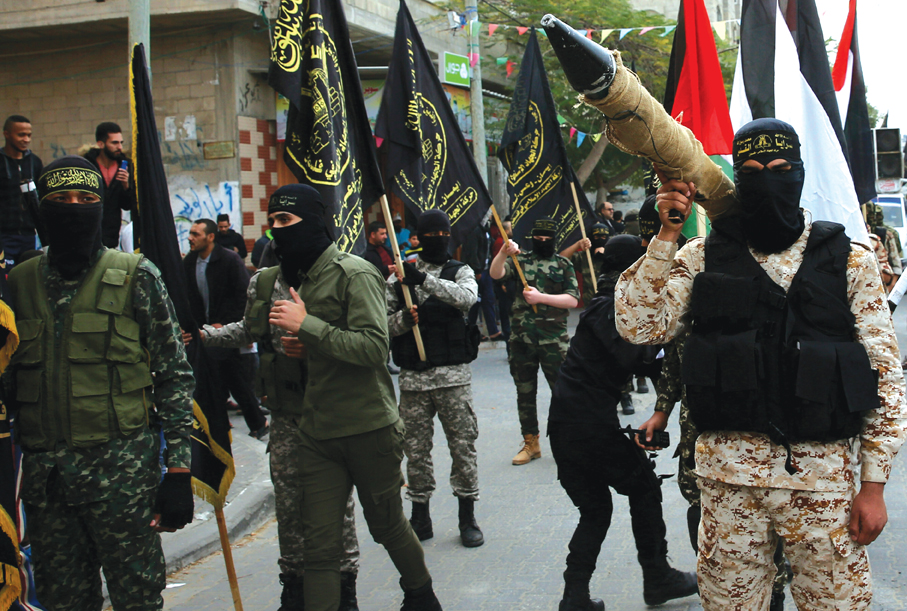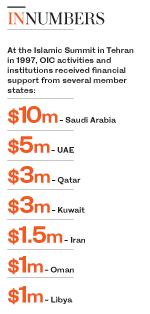JEDDAH: With the theme “Hand in Hand toward the Future,” and an agenda packed with issues affecting the Muslim world, the 14th ordinary summit of the Organization of Islamic Cooperation (OIC) convenes in the Saudi holy city of Makkah on Friday.
Saudi Arabia’s King Salman will chair the Islamic Summit, a gathering of monarchs, heads of state and government that dates back 50 years, and nowadays convenes every three years to deliberate, make decisions and try to resolve crises in Muslim-majority countries.
This year, the summit coincides with two emergency meetings — the Arab League and Gulf Cooperation Council (GCC) summits — called by King Salman amid escalating tensions between Iran on one side and the US and its Gulf allies on the other.
The summit in Makkah is expected to address a long list of pressing political problems, including the Israeli-Palestinian conflict, rising anti-Muslim prejudice in different parts of the world, and violent extremism.
Coinciding with the final days of Ramadan, the summit is expected to deal with the consequences of the US decision last year to move its embassy in Israel from Tel Aviv to Jerusalem; the suffering of Syrian civilians due to an ongoing military assault in Idlib province; and the destabilizing activities of Iran and its proxy forces in the Middle East. Amid rising tensions between the US and Iran, attacks on four commercial vessels near the UAE’s Fujairah port earlier this month have raised serious questions about maritime security in the Gulf. Senior US officials have pointed the finger at Tehran.
The incidents, which included attacks on two Saudi oil tankers, drew strong condemnation from governments in the Middle East and worldwide, as well as the Arab League. The acts of sabotage were followed by strikes by explosives-laden drones on Saudi oil installations, which led to a temporary closure of the East-West pipeline.
A TV station run by Yemen’s Iran-backed Houthi militia said it had launched drone attacks on Saudi installations. The incidents were described by the OIC as a threat to the security and safety of international maritime traffic.
On Wednesday, addressing the preparatory meeting of OIC foreign ministers in Jeddah, Saudi Foreign Minister Ibrahim Al-Assaf said: “Tehran’s support for Houthi rebels in Yemen is proof of Iranian interference in other nations’ affairs, and this is something that ... Islamic countries should reject.”
Al-Assaf, who chaired the meeting, said the Kingdom condemned the attacks aimed at threatening the supply of oil, and called for a UN-backed political solution in Syria. He added: “I would like to emphasize that the Palestinian issue is a paramount Saudi concern, in particular the Palestinian people’s full legitimate rights, and the establishment of an independent state with East Jerusalem as its capital.”
Speaking at the preparatory meeting, OIC Secretary-General Yousef Al-Othaimeen expressed his gratitude to King Salman and Crown Prince Mohammed bin Salman for Saudi Arabia’s hosting of the summit. Al-Othaimeen also praised the Kingdom’s support for the OIC, and its generous contributions for Islamic causes.
In a significant development in the lead up to the Islamic Summit, an anti-extremism document was signed by 1,200 figures from the Muslim world during a gathering in Makkah. The four-day event, organized by the Muslim World League (MWL), was attended by dignitaries, scholars, senior officials and leading thinkers, who between them represented 139 countries and 27 Islamic sects.

Members of the Palestinian Islamic Jihad group march in December 2017 to protest the US decision to recognize Jerusalem as Israel’s capital. (AP)
King Salman was the first leader to sign the declaration, and later received the scholars in Makkah, where he was handed the final document. It says religious and cultural diversity does not justify conflict, and civilized dialogue is the path to overcoming historical differences.
The declaration condemns attacks on places of worship, calling them criminal acts that require a strong legislative and security response. It says the extremist ideas that motivate such attacks need to be challenged.
The document urges non-interference in the affairs of other states, and singles out for criticism dissemination of sectarian ideas.
 It recognizes the importance of women’s empowerment, rejects their marginalization, and opposes the denial of opportunities for them in various fields.
It recognizes the importance of women’s empowerment, rejects their marginalization, and opposes the denial of opportunities for them in various fields.
The document says it is everyone’s duty to fight terrorism, injustice, oppression and human rights violations. It also urges greater environmental protection, saying wasting natural resources and causing pollution infringe on the rights of future generations.
Salem Al-Yami, an international-relations analyst, said the three conferences in Makkah were taking place at a sensitive and critical moment for the Middle East. “The summits are a chance to enlighten some Muslim brothers and Arabs as to the true nature of the current conflicts since they may not be fully aware of the reality,” Al-Yami told Sky News Arabia.
Once they have the full facts at their disposal, the leaders attending the conferences will become aware of their individual responsibilities, be they from Arab, GCC or Muslim countries, Al-Yami said.
He said it is evident from the recent sabotage incidents near UAE’s Fujairah port, the attacks on Saudi Arabia’s oil stations, and the rocket strikes on the Green Zone in Baghdad that Iran is trying to stir tensions across the Middle East.
Al-Yami said there is no denying that relations between some of the summit attendees are less than cordial. “Some governments do not have a clear position on the regional situation,” he said. “Still, the objective of the summits is to clarify the picture and devise ways to confront the challenges.”
According to Al-Yami, the international community has a duty to stand by the countries that Iran is trying to drag into its conflict with the US in view of the vital role they play in global economic stability.
“The (oil) wealth serves not just our own interest. We have partners who benefit from this wealth. So they should also take a firm position on the matters at issue,” Al-Yami said.
The OIC is the second-largest inter-governmental institution after the UN, with 57 member states from four continents. It is the voice of 1.5 billion Muslims worldwide. Between 1969 and 2016 there were 13 Islamic summits, with seven held for emergencies in the capitals of Morocco, Saudi Arabia, Indonesia, Kuwait, Egypt, Pakistan and Turkey.
In 1970, the first Islamic Conference of Foreign Ministers was held in Jeddah, culminating in the decision to establish a permanent secretariat in the Saudi city.
















